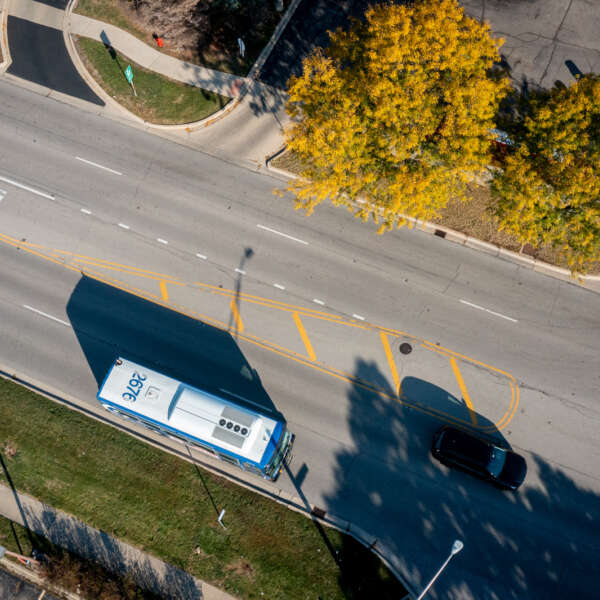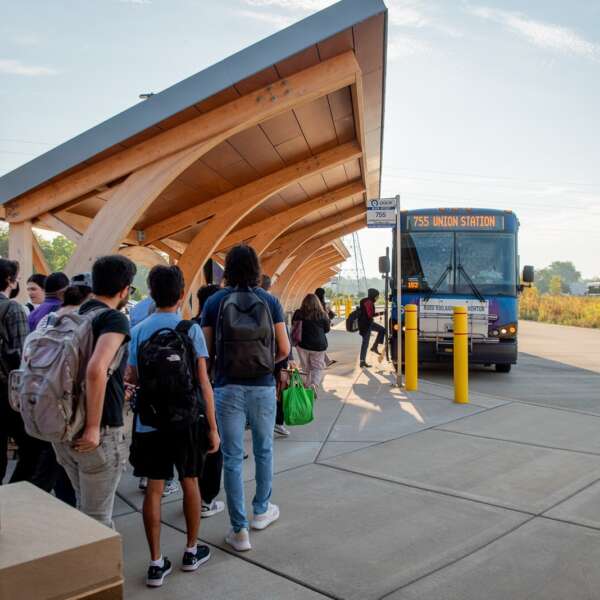RTA Citizens Advisory Board: Get to know Karl Gieseke
October 15, 2024
October 15, 2024

Following through on a key recommendation from regional transit strategic plan Transit is the Answer, the RTA launched a newly expanded, rider-focused Citizens Advisory Board (RTACAB) in March 2024, featuring the perspectives of a diverse group of 21 riders and agency leaders from across the region.
The RTACAB advises the agency’s staff and Board of Directors on accessibility, equity, and other impacts of its policies and programs. It has always included the chairpersons of CTA, Metra, and Pace Citizens Advisory Boards, as well as representatives from each of the six counties served in the RTA region. Transit is the Answer called on the agency to “expand the role of the RTACAB and strengthen the rider voice in transit planning and decision making.” The new RTACAB includes eight new “rider representative” positions: two for the City of Chicago, one for Suburban Cook County, and one each for other counties in the RTA region.
In a new Connections Blog series, RTA will profile each rider representative through a Q&A, digging into why community engagement is important, why transit matters to them, and more.

Karl Gieseke was born in Winfield and currently resides in Carol Stream. Since his childhood, he has utilized a combination of Metra and CTA transportation for work, school, and sporting events in Chicago and along the UP-West line. His passions include veteran advocacy, the impacts of transportation on the health of communities, and serving the medically underserved. He is excited to serve the ridership of DuPage County on the RTACAB.
How and why did you come to join the RTACAB as a rider representative?
I had heard about this opportunity through my alma mater (University of Illinois Chicago) and wanted to get involved. I’ve been a consistent user of our public transit system and wanted to make sure the voices of my fellow commuters were heard.
What is your transit experience like? What do you like about riding transit, and what could be improved?
I take a combination of Metra and the CTA Pink Line to get to work every day and used it for both my undergraduate and graduate studies as well. I enjoy that my commute offers me a chance to get a little work done on the way in and that I can just decompress from the day on the way home. Most conductors are friendly and polite, and it’s nice to see a familiar face most days. I think that timeliness and equipment reliability is a huge opportunity for improvement, as well as safety on the L.
Why are you passionate about transit?
I’m passionate about transit because it enables people to work and play in different communities without needing a car. Everyone deserves the opportunity to access things like medical care, groceries, and entertainment, and a robust public transit system helps to facilitate that.
How does transit interplay with health? How can investing in transit lead to a healthier Chicago region?
Transit plays a pivotal role in helping to build healthy communities. Not only is access to medical services important, but ensuring that people have access to grocery stores with healthy food options is as well. Further, there’s the environmental aspect of it. Our most vulnerable communities are the most impacted by poor air quality. A better transit system could reduce the number of vehicles on the road, leading to better air quality in the area.
What are your ideas for building the public and political support to invest in transit?
It has to be a collaborative effort. Consumers need to feel like they have a voice in how their fare revenue and tax dollars are spent, and politicians and local leaders need to understand that there are downstream effects on their constituents if transit is NOT invested in. Trust needs to be built, which requires transparency.
What would it mean for riders in the communities you represent if transit is unable to find a sustainable funding solution to the fiscal cliff and experiences major service cuts?
Major service cuts would have a significant negative impact on the communities I represent. Less Metra service to the western suburbs would create overcrowding on morning and afternoon trains. CTA service cuts would further degrade the ability of patients to access healthcare services and would also result in lost jobs and wages.
Why do you think it’s important for public agencies like the RTA to engage with communities, such as through the newly expanded RTACAB?
It all comes down to developing trust. In healthcare, the most important stakeholder is the patient receiving services, so it’s imperative to develop trust with the patient before those services are rendered. As such, the consumers/purchasers of transit services are, in my mind, the greatest stakeholders. Riders deserve to have their voices heard and opinions considered as the RTA works through challenges.
What do you think is missing from current conversations about public transportation policy issues?
One thing that I haven’t heard in current conversation is how to leverage AI in public transit. I know that there are more pressing issues, but I would be interested to see if there are innovative ways to use AI and predictive analytics to anticipate demand and optimize efficiency. I’m sure there are some great data scientists working on this, but I’d love to see the RTA really explore some more innovative options. I’d also like to see a focus on environmental sustainability in public transportation.
What is your favorite transit memory?
My favorite transit memory was taking the train to the 2013 Blackhawks Stanley Cup parade with my best friend. I was deployed when the Hawks had won in 2010, and he and I met in Afghanistan in 2011, which is where we discovered we were both Hawks fans from the Chicagoland area. The train was so full of Hawks fans, and it was an absolute party of a day that I’ll never forget.
Subscribe to our Newsletter
Related Articles
 Coalition members provide feedback on ‘Transforming Transit,’ RTA’s vision for improved service and accountability
Coalition members provide feedback on ‘Transforming Transit,’ RTA’s vision for improved service and accountability
Nearly 200 riders, advocates, and other stakeholders met virtually with the RTA on February 11 for the sixth quarterly Transit is the Answer Coalition meetin...
February 20, 2025 Far South Halsted Corridor Study prepares for future Pace Pulse service
Far South Halsted Corridor Study prepares for future Pace Pulse service
An RTA Community Planning project kicked off in late 2023 as a crucial step in bringing Pace Pulse service to Chicago’s south suburbs. The Far South Halsted ...
February 19, 2025 RTA proposes reforms to prioritize capital projects, maximizing impact of funding
RTA proposes reforms to prioritize capital projects, maximizing impact of funding
RTA is proposing a historic restructuring of the region’s transit governance to maximize the impact of new operating funding and ensure all riders experience...
February 5, 2025 RTA proposes reforms to integrate fares, require accountability for faster and more reliable transit
RTA proposes reforms to integrate fares, require accountability for faster and more reliable transit
RTA is proposing a historic restructuring of the region’s transit governance to maximize the impact of any new operating funding and ensure all riders experi...
February 5, 2025 For the third year in a row, regional transit ridership was up by double-digits in 2024
For the third year in a row, regional transit ridership was up by double-digits in 2024
Ridership across the Chicago region’s transit system continued to increase throughout 2024, according to the latest data from CTA, Metra, and Pace. The regio...
January 28, 2025 RTA is seeking $1.5 billion in annual operating funding. What would that mean for your commute?
RTA is seeking $1.5 billion in annual operating funding. What would that mean for your commute?
On January 15, RTA released Transforming Transit, a vision for the regional transit system with $1.5 billion in annual operating funding supported by a stron...
January 28, 2025